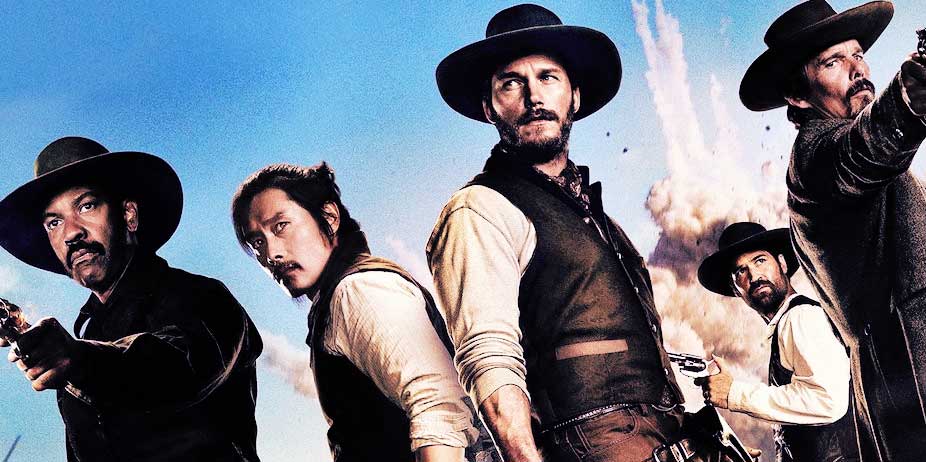 The
Magnificent Seven (2016)
The
Magnificent Seven (2016)
Reviewer: Gabriel Mohler
The Magnificent Seven is one of the best films
of 2016. The title is well-earned by its smoldering cast
(including two professing Christian actors, Denzel
Washington and Chris Pratt), and director Antoine Fuqua has
pulled off several feats with this film. First, he has
redeemed himself from some of his more recent movies, like
the forgettable Southpaw and the low-grade
Olympus Has Fallen. Second, he has masterfully brought
the western genre back to the big screen, leaving last
year’s The Hateful Eight in the dust. Thirdly, he
made a remake that didn’t stink—no, it didn’t do everything
better than the original, but it holds up worthily. And
fourthly, this is probably his best film.
Many will see this film for Denzel Washington, Chris Pratt,
and Ethan Hawke. But the not-so-famous actors give just as
outstanding performances as these three. Vincent D'Onofrio,
who most viewers will know from Jurassic World,
plays a very emotional backwoodsman who has endured a lot
throughout his years. This character is a devout Christian
who is constantly heard praying and quoting Scripture, even
in the midst of battle scenes. Byung-hun Lee, Manuel Garcia-Rulfo,
and Martin Sensmeier are excellent representatives of their
diverse characters as Chinese, Mexican, and Native American.
Matt Bomer also has a brief, but memorable, appearance at
the beginning. Haley Bennett steals every scene she is in,
playing a grieving but strong woman whose husband was
murdered. This is what causes her to hire the seven men to
defend the town from a gang trying to take over it.
While the plot is quite simple, there is strong character
development and contemplative discussions about how all the
warriors feel about what they’re doing. These things don’t
drag the film out unnecessarily, and the well-paced action
flares up the screen in satisfactory time. My recommendation
of this film does not come without caution. This is
essentially a war movie. Sure, the war is fictional, it’s
confined to a single town, and it only lasts one battle. But
it’s a war nonetheless—an army against an army. Not all the
protagonists are angelic heroes. Some of the recruits join
for self-serving reasons, and a few are initially murderous
outlaws. Chris Pratt’s character is a sort of cowboy version
of Han Solo—part womanizing, drinking gambler, and part
heart of gold who wants to help people. However, the more
these men work with the Godly heroes, the more they consider
their own lives that they are about to risk for a righteous
cause.
Several poignant scenes that take place in a church, such as
when the seven men are encouraged to get right with God
before going to battle. SPOILER ALERT—At the end, when the
bounty hunter catches the ringleader, he takes him to the
church and tells him to pray before his execution—END OF
SPOILER. There are a few references to revenge, but the
violent battle at the end is a necessary means to protect
the innocent town. I also appreciated the film’s realistic
approach to war. This isn’t one of those films where all the
good guys survive because the bad guys can’t shoot straight.
No, good guys and well as bad guys die here.
This film definitely lived up to the rip-roaring, rollicking
fun I expected, but was also more thought-provoking than I
expected. And though there is some objectionable content
here and there, I was very pleasantly surprised by the
amount of Christian faith displayed. The Magnificent
Seven is a magnificent movie!
Sexual Content:
The sexual content is all implied, and there is very little even
of that. A few innuendos are made, and we see a few women that are apparently
prostitutes (sadly part of the time period), but there is no explicit content or
excessive immodesty. We also get a glimpse of a woman’s cleavage as she bends
over her husband, who has just been shot.
Language:
There are several utterances of the usual language you’d expect
from a period-accurate western. D**n and s**t are probably used about five to
ten times, and there are some misuses of God’s name, as well—although sometimes
it’s hard to tell whether they’re actually misusing it or crying out.
Violence:
The violence stays within its PG-13 boundaries, but on the heavy
side. Almost every weapon of the period is used, from tiny Chinese darts to
dynamite. There is very little blood, but that is made up for by a high body
count.
